Examining Physician Assisted Death in Canada: A Critical Essay
VerifiedAdded on 2023/06/10
|5
|1314
|305
Essay
AI Summary
This essay presents a philosophical argument in favor of physician-assisted death (PAD) in Canada, contending that it is a dignified and humane option for individuals suffering from irremediable diseases. It addresses counterarguments, such as the perversion of a doctor's role and the potential for societal degeneration, by emphasizing patient autonomy, the importance of psychological assessment, and the need for stringent legal oversight. The essay references the Supreme Court of Canada's legalization of PAD and the 'Carter versus Canada' lawsuit, ultimately concluding that while any form of death is lamentable, respecting a person's free will in choosing death to alleviate prolonged suffering is justified, provided proper safeguards are in place to prevent misuse.
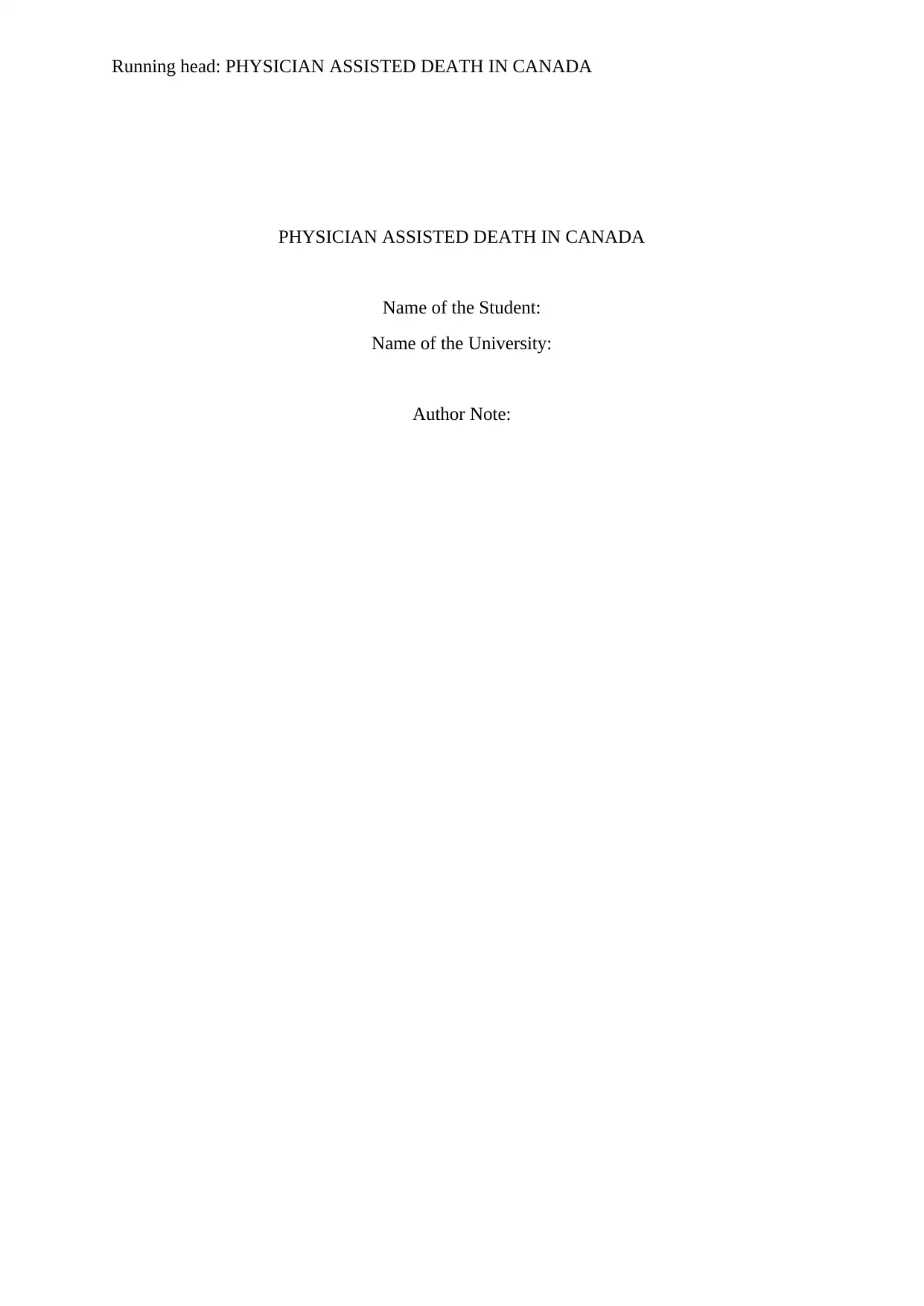
Running head: PHYSICIAN ASSISTED DEATH IN CANADA
PHYSICIAN ASSISTED DEATH IN CANADA
Name of the Student:
Name of the University:
Author Note:
PHYSICIAN ASSISTED DEATH IN CANADA
Name of the Student:
Name of the University:
Author Note:
Paraphrase This Document
Need a fresh take? Get an instant paraphrase of this document with our AI Paraphraser
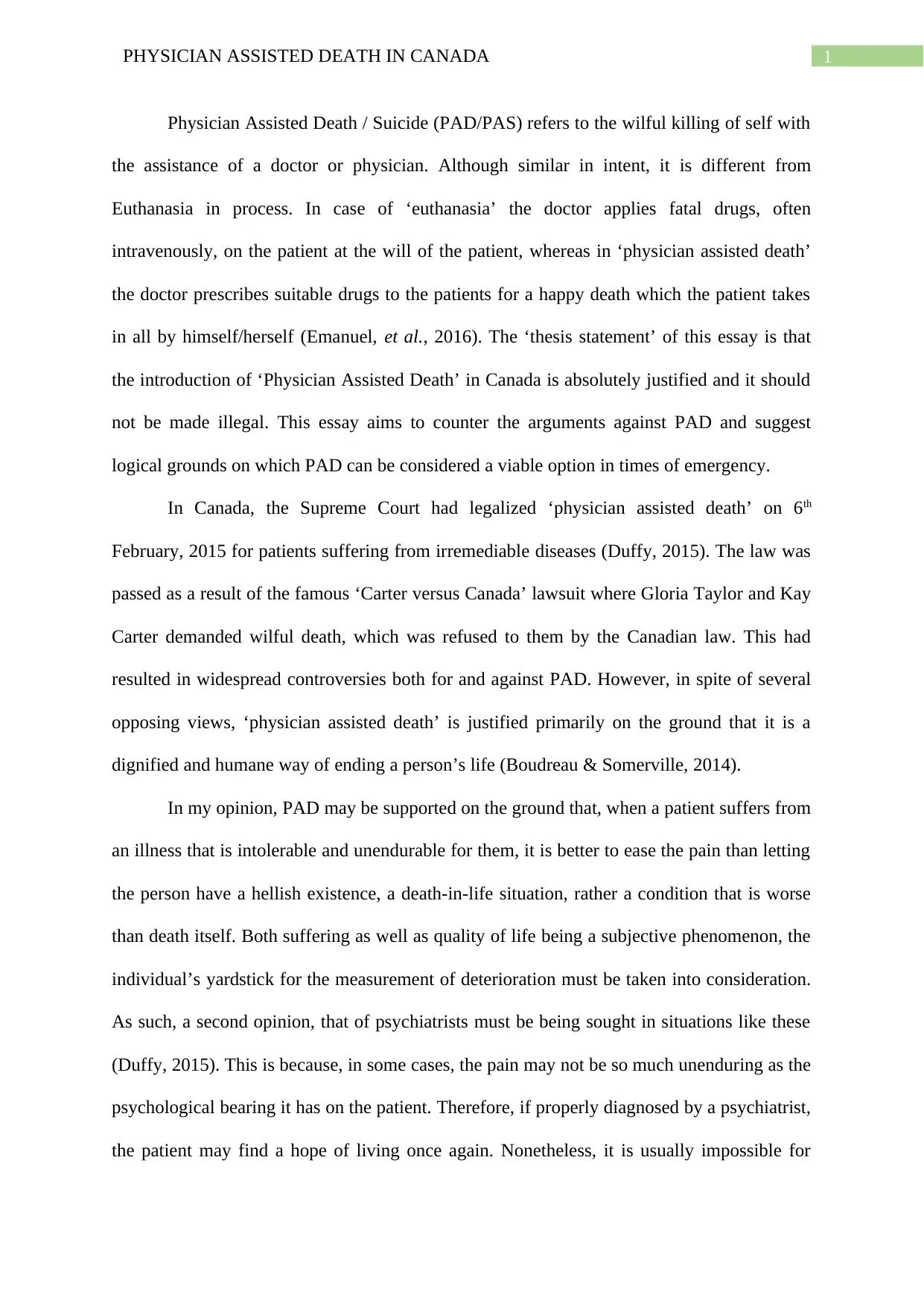
1PHYSICIAN ASSISTED DEATH IN CANADA
Physician Assisted Death / Suicide (PAD/PAS) refers to the wilful killing of self with
the assistance of a doctor or physician. Although similar in intent, it is different from
Euthanasia in process. In case of ‘euthanasia’ the doctor applies fatal drugs, often
intravenously, on the patient at the will of the patient, whereas in ‘physician assisted death’
the doctor prescribes suitable drugs to the patients for a happy death which the patient takes
in all by himself/herself (Emanuel, et al., 2016). The ‘thesis statement’ of this essay is that
the introduction of ‘Physician Assisted Death’ in Canada is absolutely justified and it should
not be made illegal. This essay aims to counter the arguments against PAD and suggest
logical grounds on which PAD can be considered a viable option in times of emergency.
In Canada, the Supreme Court had legalized ‘physician assisted death’ on 6th
February, 2015 for patients suffering from irremediable diseases (Duffy, 2015). The law was
passed as a result of the famous ‘Carter versus Canada’ lawsuit where Gloria Taylor and Kay
Carter demanded wilful death, which was refused to them by the Canadian law. This had
resulted in widespread controversies both for and against PAD. However, in spite of several
opposing views, ‘physician assisted death’ is justified primarily on the ground that it is a
dignified and humane way of ending a person’s life (Boudreau & Somerville, 2014).
In my opinion, PAD may be supported on the ground that, when a patient suffers from
an illness that is intolerable and unendurable for them, it is better to ease the pain than letting
the person have a hellish existence, a death-in-life situation, rather a condition that is worse
than death itself. Both suffering as well as quality of life being a subjective phenomenon, the
individual’s yardstick for the measurement of deterioration must be taken into consideration.
As such, a second opinion, that of psychiatrists must be being sought in situations like these
(Duffy, 2015). This is because, in some cases, the pain may not be so much unenduring as the
psychological bearing it has on the patient. Therefore, if properly diagnosed by a psychiatrist,
the patient may find a hope of living once again. Nonetheless, it is usually impossible for
Physician Assisted Death / Suicide (PAD/PAS) refers to the wilful killing of self with
the assistance of a doctor or physician. Although similar in intent, it is different from
Euthanasia in process. In case of ‘euthanasia’ the doctor applies fatal drugs, often
intravenously, on the patient at the will of the patient, whereas in ‘physician assisted death’
the doctor prescribes suitable drugs to the patients for a happy death which the patient takes
in all by himself/herself (Emanuel, et al., 2016). The ‘thesis statement’ of this essay is that
the introduction of ‘Physician Assisted Death’ in Canada is absolutely justified and it should
not be made illegal. This essay aims to counter the arguments against PAD and suggest
logical grounds on which PAD can be considered a viable option in times of emergency.
In Canada, the Supreme Court had legalized ‘physician assisted death’ on 6th
February, 2015 for patients suffering from irremediable diseases (Duffy, 2015). The law was
passed as a result of the famous ‘Carter versus Canada’ lawsuit where Gloria Taylor and Kay
Carter demanded wilful death, which was refused to them by the Canadian law. This had
resulted in widespread controversies both for and against PAD. However, in spite of several
opposing views, ‘physician assisted death’ is justified primarily on the ground that it is a
dignified and humane way of ending a person’s life (Boudreau & Somerville, 2014).
In my opinion, PAD may be supported on the ground that, when a patient suffers from
an illness that is intolerable and unendurable for them, it is better to ease the pain than letting
the person have a hellish existence, a death-in-life situation, rather a condition that is worse
than death itself. Both suffering as well as quality of life being a subjective phenomenon, the
individual’s yardstick for the measurement of deterioration must be taken into consideration.
As such, a second opinion, that of psychiatrists must be being sought in situations like these
(Duffy, 2015). This is because, in some cases, the pain may not be so much unenduring as the
psychological bearing it has on the patient. Therefore, if properly diagnosed by a psychiatrist,
the patient may find a hope of living once again. Nonetheless, it is usually impossible for
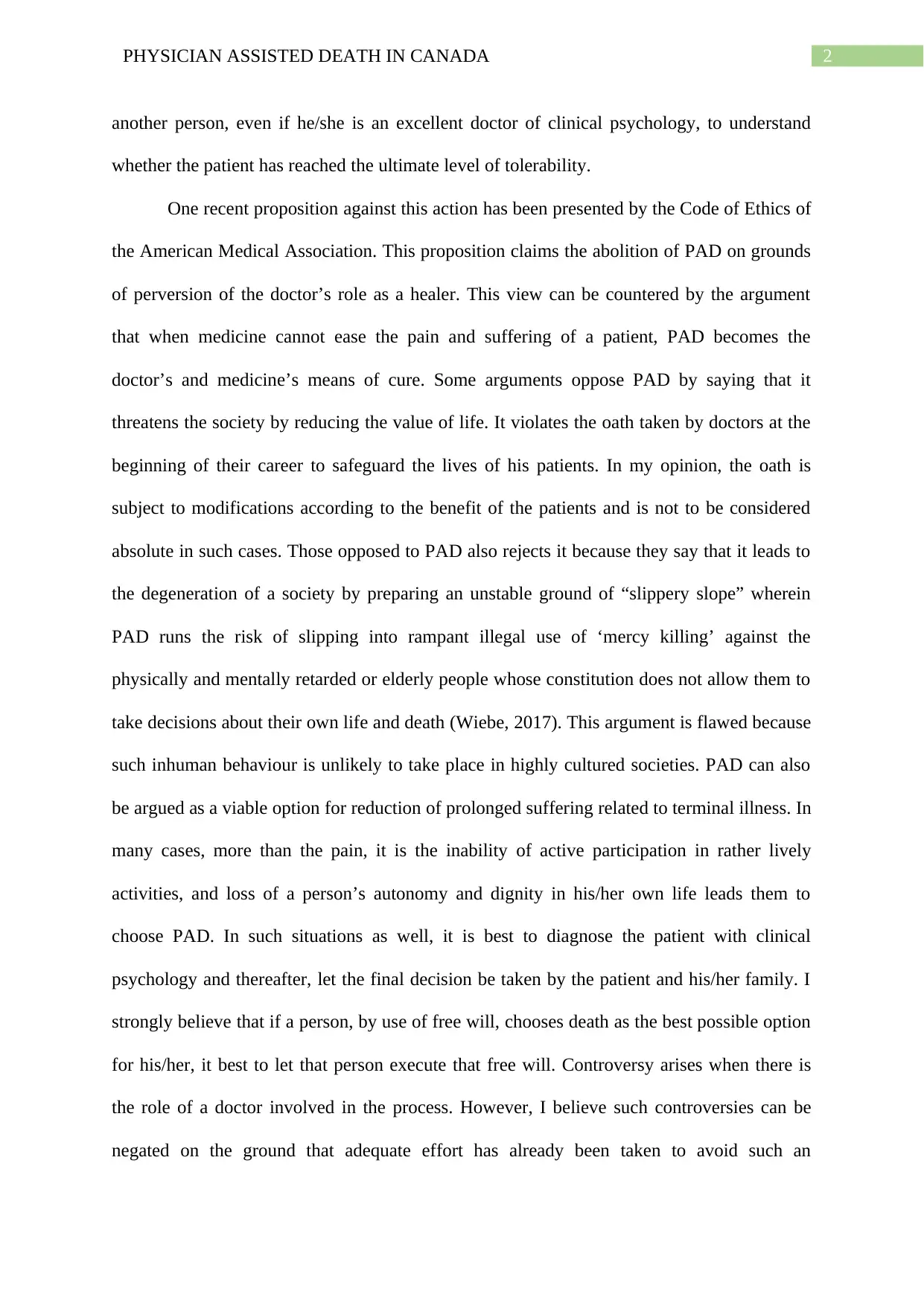
2PHYSICIAN ASSISTED DEATH IN CANADA
another person, even if he/she is an excellent doctor of clinical psychology, to understand
whether the patient has reached the ultimate level of tolerability.
One recent proposition against this action has been presented by the Code of Ethics of
the American Medical Association. This proposition claims the abolition of PAD on grounds
of perversion of the doctor’s role as a healer. This view can be countered by the argument
that when medicine cannot ease the pain and suffering of a patient, PAD becomes the
doctor’s and medicine’s means of cure. Some arguments oppose PAD by saying that it
threatens the society by reducing the value of life. It violates the oath taken by doctors at the
beginning of their career to safeguard the lives of his patients. In my opinion, the oath is
subject to modifications according to the benefit of the patients and is not to be considered
absolute in such cases. Those opposed to PAD also rejects it because they say that it leads to
the degeneration of a society by preparing an unstable ground of “slippery slope” wherein
PAD runs the risk of slipping into rampant illegal use of ‘mercy killing’ against the
physically and mentally retarded or elderly people whose constitution does not allow them to
take decisions about their own life and death (Wiebe, 2017). This argument is flawed because
such inhuman behaviour is unlikely to take place in highly cultured societies. PAD can also
be argued as a viable option for reduction of prolonged suffering related to terminal illness. In
many cases, more than the pain, it is the inability of active participation in rather lively
activities, and loss of a person’s autonomy and dignity in his/her own life leads them to
choose PAD. In such situations as well, it is best to diagnose the patient with clinical
psychology and thereafter, let the final decision be taken by the patient and his/her family. I
strongly believe that if a person, by use of free will, chooses death as the best possible option
for his/her, it best to let that person execute that free will. Controversy arises when there is
the role of a doctor involved in the process. However, I believe such controversies can be
negated on the ground that adequate effort has already been taken to avoid such an
another person, even if he/she is an excellent doctor of clinical psychology, to understand
whether the patient has reached the ultimate level of tolerability.
One recent proposition against this action has been presented by the Code of Ethics of
the American Medical Association. This proposition claims the abolition of PAD on grounds
of perversion of the doctor’s role as a healer. This view can be countered by the argument
that when medicine cannot ease the pain and suffering of a patient, PAD becomes the
doctor’s and medicine’s means of cure. Some arguments oppose PAD by saying that it
threatens the society by reducing the value of life. It violates the oath taken by doctors at the
beginning of their career to safeguard the lives of his patients. In my opinion, the oath is
subject to modifications according to the benefit of the patients and is not to be considered
absolute in such cases. Those opposed to PAD also rejects it because they say that it leads to
the degeneration of a society by preparing an unstable ground of “slippery slope” wherein
PAD runs the risk of slipping into rampant illegal use of ‘mercy killing’ against the
physically and mentally retarded or elderly people whose constitution does not allow them to
take decisions about their own life and death (Wiebe, 2017). This argument is flawed because
such inhuman behaviour is unlikely to take place in highly cultured societies. PAD can also
be argued as a viable option for reduction of prolonged suffering related to terminal illness. In
many cases, more than the pain, it is the inability of active participation in rather lively
activities, and loss of a person’s autonomy and dignity in his/her own life leads them to
choose PAD. In such situations as well, it is best to diagnose the patient with clinical
psychology and thereafter, let the final decision be taken by the patient and his/her family. I
strongly believe that if a person, by use of free will, chooses death as the best possible option
for his/her, it best to let that person execute that free will. Controversy arises when there is
the role of a doctor involved in the process. However, I believe such controversies can be
negated on the ground that adequate effort has already been taken to avoid such an
⊘ This is a preview!⊘
Do you want full access?
Subscribe today to unlock all pages.

Trusted by 1+ million students worldwide
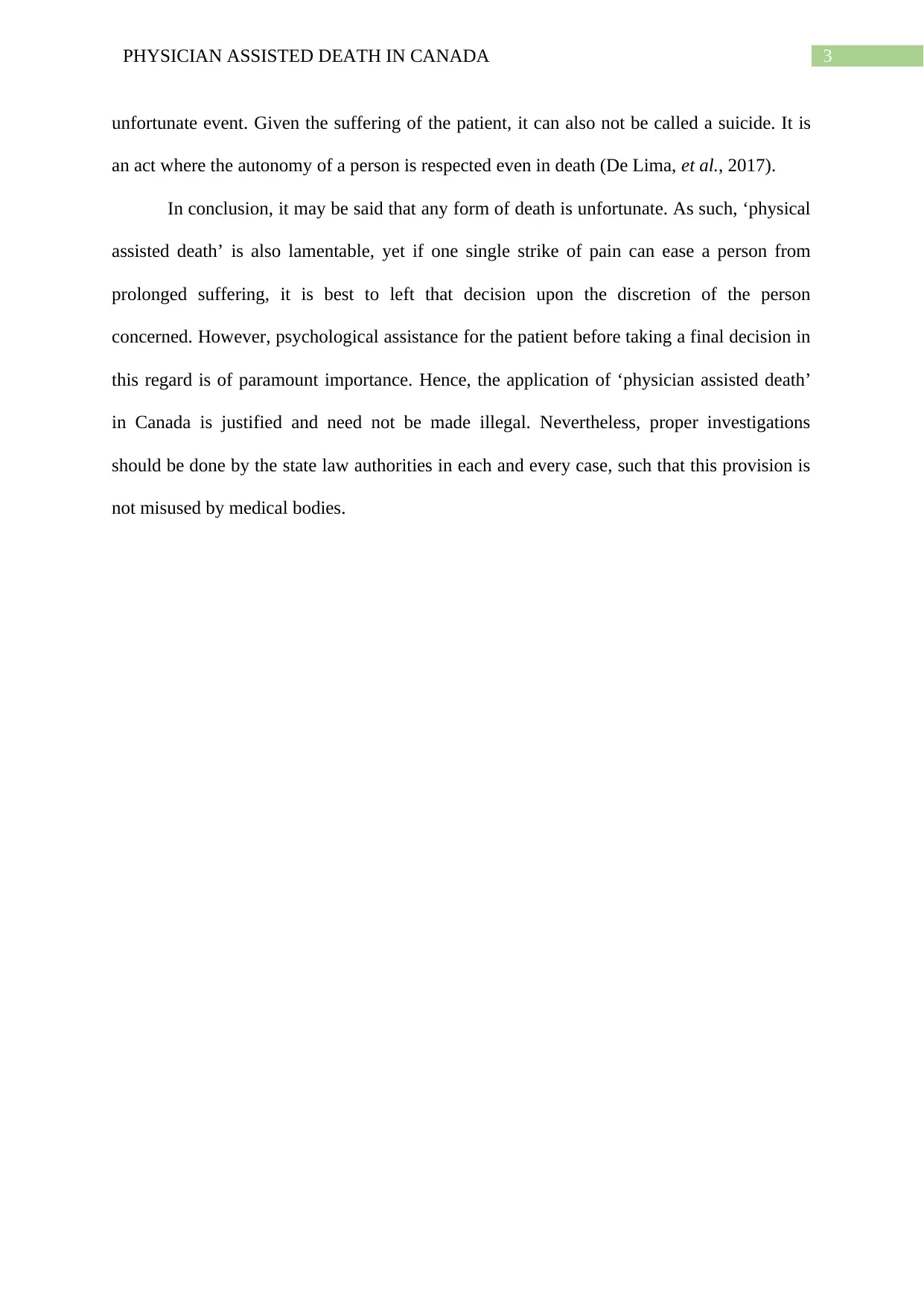
3PHYSICIAN ASSISTED DEATH IN CANADA
unfortunate event. Given the suffering of the patient, it can also not be called a suicide. It is
an act where the autonomy of a person is respected even in death (De Lima, et al., 2017).
In conclusion, it may be said that any form of death is unfortunate. As such, ‘physical
assisted death’ is also lamentable, yet if one single strike of pain can ease a person from
prolonged suffering, it is best to left that decision upon the discretion of the person
concerned. However, psychological assistance for the patient before taking a final decision in
this regard is of paramount importance. Hence, the application of ‘physician assisted death’
in Canada is justified and need not be made illegal. Nevertheless, proper investigations
should be done by the state law authorities in each and every case, such that this provision is
not misused by medical bodies.
unfortunate event. Given the suffering of the patient, it can also not be called a suicide. It is
an act where the autonomy of a person is respected even in death (De Lima, et al., 2017).
In conclusion, it may be said that any form of death is unfortunate. As such, ‘physical
assisted death’ is also lamentable, yet if one single strike of pain can ease a person from
prolonged suffering, it is best to left that decision upon the discretion of the person
concerned. However, psychological assistance for the patient before taking a final decision in
this regard is of paramount importance. Hence, the application of ‘physician assisted death’
in Canada is justified and need not be made illegal. Nevertheless, proper investigations
should be done by the state law authorities in each and every case, such that this provision is
not misused by medical bodies.
Paraphrase This Document
Need a fresh take? Get an instant paraphrase of this document with our AI Paraphraser
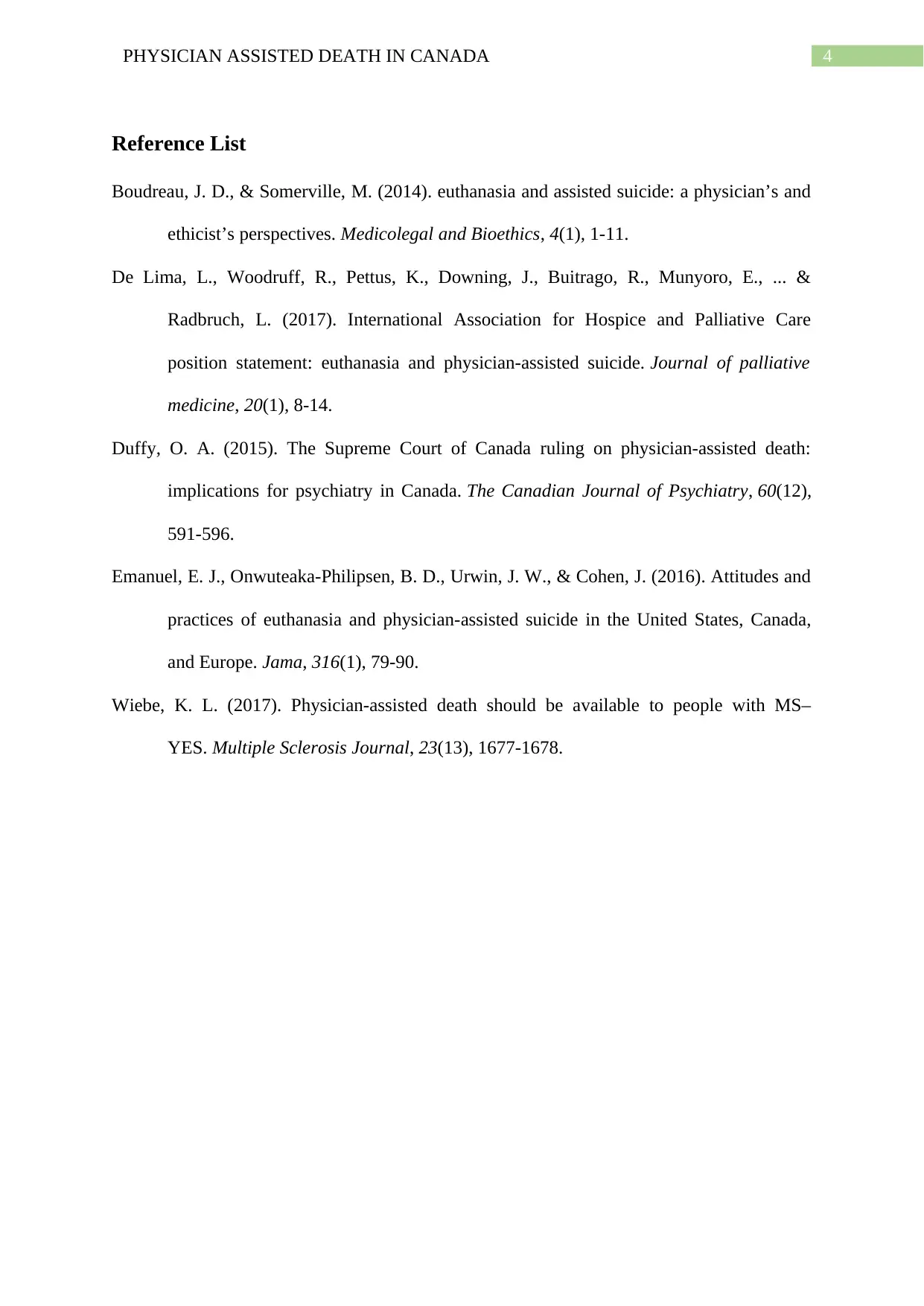
4PHYSICIAN ASSISTED DEATH IN CANADA
Reference List
Boudreau, J. D., & Somerville, M. (2014). euthanasia and assisted suicide: a physician’s and
ethicist’s perspectives. Medicolegal and Bioethics, 4(1), 1-11.
De Lima, L., Woodruff, R., Pettus, K., Downing, J., Buitrago, R., Munyoro, E., ... &
Radbruch, L. (2017). International Association for Hospice and Palliative Care
position statement: euthanasia and physician-assisted suicide. Journal of palliative
medicine, 20(1), 8-14.
Duffy, O. A. (2015). The Supreme Court of Canada ruling on physician-assisted death:
implications for psychiatry in Canada. The Canadian Journal of Psychiatry, 60(12),
591-596.
Emanuel, E. J., Onwuteaka-Philipsen, B. D., Urwin, J. W., & Cohen, J. (2016). Attitudes and
practices of euthanasia and physician-assisted suicide in the United States, Canada,
and Europe. Jama, 316(1), 79-90.
Wiebe, K. L. (2017). Physician-assisted death should be available to people with MS–
YES. Multiple Sclerosis Journal, 23(13), 1677-1678.
Reference List
Boudreau, J. D., & Somerville, M. (2014). euthanasia and assisted suicide: a physician’s and
ethicist’s perspectives. Medicolegal and Bioethics, 4(1), 1-11.
De Lima, L., Woodruff, R., Pettus, K., Downing, J., Buitrago, R., Munyoro, E., ... &
Radbruch, L. (2017). International Association for Hospice and Palliative Care
position statement: euthanasia and physician-assisted suicide. Journal of palliative
medicine, 20(1), 8-14.
Duffy, O. A. (2015). The Supreme Court of Canada ruling on physician-assisted death:
implications for psychiatry in Canada. The Canadian Journal of Psychiatry, 60(12),
591-596.
Emanuel, E. J., Onwuteaka-Philipsen, B. D., Urwin, J. W., & Cohen, J. (2016). Attitudes and
practices of euthanasia and physician-assisted suicide in the United States, Canada,
and Europe. Jama, 316(1), 79-90.
Wiebe, K. L. (2017). Physician-assisted death should be available to people with MS–
YES. Multiple Sclerosis Journal, 23(13), 1677-1678.
1 out of 5
Your All-in-One AI-Powered Toolkit for Academic Success.
+13062052269
info@desklib.com
Available 24*7 on WhatsApp / Email
![[object Object]](/_next/static/media/star-bottom.7253800d.svg)
Unlock your academic potential
Copyright © 2020–2026 A2Z Services. All Rights Reserved. Developed and managed by ZUCOL.


